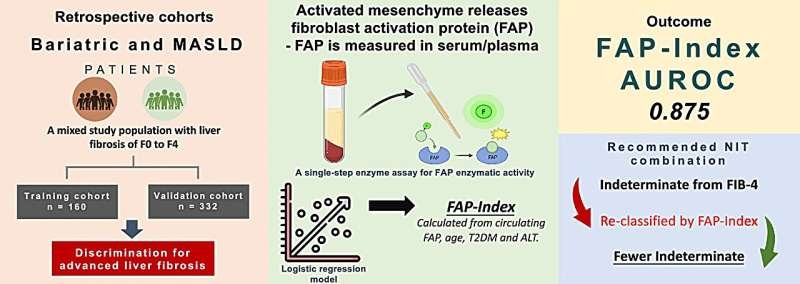Diabetic Blood Tests Affected by Elevated Liver Enzymes
By LabMedica International staff writers
Posted on 28 Jun 2012
Diabetes is currently diagnosed using venous fasting plasma glucose or an oral glucose tolerance test, although some authorities are recommending the HbA1c blood test as an alternative. Posted on 28 Jun 2012
Measurement of glycated hemoglobin (HbA1c) has several advantages over glucose, but there are also potential disadvantages, with falsely low results in patients with increased liver enzyme concentrations in general, but also in severe liver disease and liver failure.
Clinical biochemists at the Odense University Hospital (Denmark) investigated the correlation between HbA1c and venous fasting plasma glucose. For comparison, a large cohort of 10,065 patients with different degrees of increased plasma liver enzyme measurements was compared with a control group with normal liver function. The mean age of both male and female patients was 57 years.
Analysis of alanine aminotransferase (ALT), gamma glutamine transferase (GGT) and glucose were performed in a Modular System (Roche Diagnostics; Basel, Switzerland) with dedicated reagents. HbA1c was measured by high-performance liquid chromatography as fraction of total hemoglobin using either a Tosoh G5 or G7 analyzer (Medinor; Broendby, Denmark). Correlations were investigated in four patient groups divided according to their liver enzyme concentrations.
The correlation between HbA1c and plasma glucose was high in all groups, which was confirmed with multiple regression analysis. The interaction analysis revealed that linear regression lines were significantly different for men and women, with increase of both liver enzyme measurements and also for women, with increased ALT. Of note, GGT also remained significantly associated with HbA1c while ALT did not correlate significantly with HbA1c in this model. When compared with biological variation for HbA1c, only men with increased measurements of both liver enzymes had a clinically important decrease in HbA1c.
The authors concluded that the study strongly indicates that increased liver enzyme concentrations in general do not bias the correlation between glycated hemoglobin and fasting plasma glucose. However, men with increased concentrations of both liver enzymes do have a slightly decreased HbA1c, and, if the clinical suspicion is strong enough, one should consider supplementary testing. Of note, patients with distinct liver failure and/or pronounced hemolysis were not evaluated in this study and HbA1c results should therefore be interpreted with caution in such patients. The study was published on May 16, 2012, in the journal Diabetic Medicine.
Related Links:
Odense University Hospital
Roche Diagnostics
Medinor














